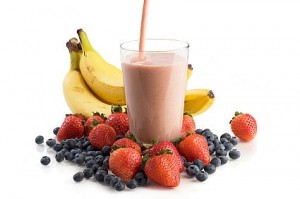An acquaintance who’s a competitive road cyclist asked about protein consumption, particularly post-ride. He got me thinking on a variety of issues regarding the topic of recovery and restoration for endurance athletes. I’ll start with post-workout nutrition
There are several goals here. The first task is to rehydrate. No matter how much you drink during a long ride or run you’re going to be dehydrated. It’s normal and not dangerous despite widespread belief to the contrary. Rehydration is very simple despite the many complicated formulas you may have read or heard about. Drink if you’re thirsty and stop when your thirst is quinched. Beyond that, check your urine color. It should be clear or very pale yellow. Dark yellow means you need to drink more. So what should you drink?

Wait 'til you're off the bike to make this.
Water is a good start, but we also need to replenish muscle glycogen and slow the breakdown of muscle protein due to the stress of a long workout. Therefore a blend of simple carbohydrate (as opposed to complex carbs) and protein is ideal. On this topic, the following is from an article by Bob Seebohar written for PT on the Net:
“Recent research has proven that consuming protein with a carbohydrate source versus a carbohydrate alone during recovery is beneficial. In fact, one study showed that the addition of protein to carbohydrate post-training led to a more rapid replenishment of glycogen and was slightly higher in glycogen restoration at four hours post training than just carbohydrate alone. Several other research studies found a reduction of total free radical buildup (by 69 percent), increased insulin levels (by 70 percent), decreased post-exercise muscle damage (by 36 percent) and increased muscle glycogen levels (2.2 fold). There is no doubt that the addition of protein to recovery nutrition is important and useful for endurance athletes. These studies used a ratio of 4:1 carbohydrate to protein intake, and while this ratio is not accepted by all scientists, the data from the studies act as a springboard for future studies that will explore and find the optimum ratio of carbohydrates to protein.
Current recommendations to enhance glycogen resynthesis post-training include eating 50 to 100 grams of rapidly absorbed carbohydrate and 10 to 20 grams of protein within the first 15 minutes after the completion of exercise. Continue this every two hours until the next complete meal.”
Based on this information, what might you post-ride/run/swim meal look like? Plain old chocolate milk can be a very good start. Chocolate milk has a nice blend of simple sugar, protein, and other nutrients that are good for us. Plus it tastes good so it’s easy to drink. It’s also quite a bit cheaper than many of the commercial athletic drinks. You could also blend a smoothie with milk, ice, fruit, and perhaps some protein powder. (There are all sorts of protein powders out there: whey, casein, egg, soy to name a few. I’ll skip the science and tell you that directly after a hard workout, whey protein is the best choice.)
Regarding daily intake for a hard-exercising endurance athlete, the common recommendation is about 1.5 grams per kilogram (2.2 lbs.) of body weight. Here’s how to determine your intake: (Your weight/2.2) x 1.5 = your daily recommended protein intake.
From my own personal experience, I can say that I have a very favorable opinion of Hammer nutrition products, especially something called Recoverite. I first used Recoverite last year when I was training for the Bicycle Tour of Colorado. I did a 90-something mile ride that started into an ugly headwind and took me through a decent portion of Colorado’s Front Range including climbs up High Grade and Shadow Mountain. I got home and I was incredibly fatigued–tired to the bone on an epic scale. I imagined I’d be sore, tight and tired for at least one if not two days. To recover, I sat in cold water, drank Recoverite (which contains whey protein and amino acids which are building blocks of protein) and then drank an energy drink containing caffeine. The next, much to my surprise, I felt amazing! I wasn’t the least bit sore or lethargic. In fact, I went on a short run.
But what was the magic ingredient? The protein drink, the cold water, or the caffeine? Hard to say but so what? Something in that mix worked very well for me. I’ll discuss cold water immersion and caffeine plus other aspects of recovery in subsequent posts.
Finally, for a very thorough analysis of not only post-workout nutrition but all aspects of nutrient timing, the Journal of the International Society of Sports Nutrition offers this position statement. This covers all athletes, not just endurance athletes.
